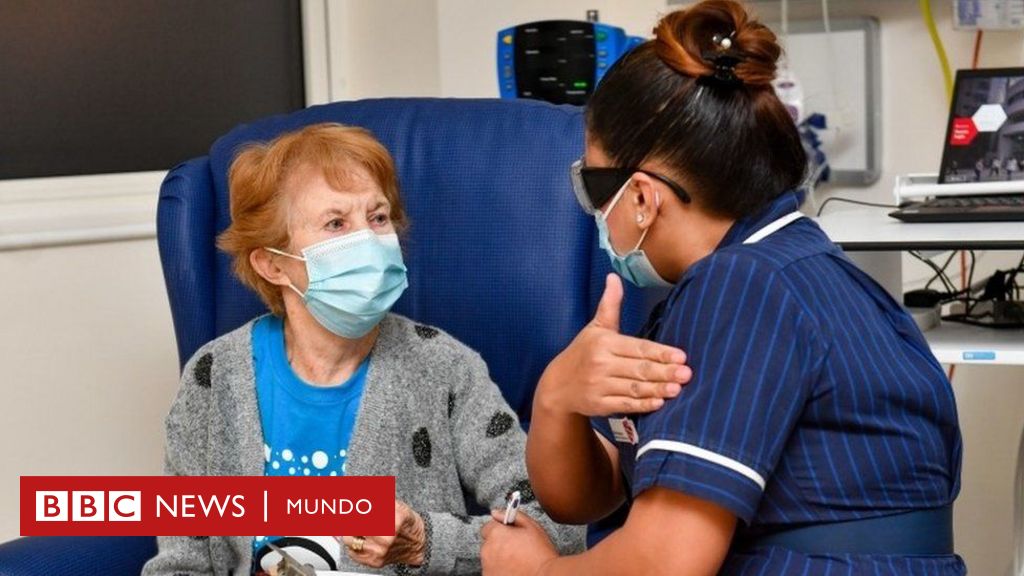- Drafting
- BBC World News
—
Updated December 8, 2020, 08:40 GMT
–
Image source, Getty Images
—
Keenan was vaccinated at University Hospital in Coventry, a city in central England.
–
A 90-year-old woman became the first person to receive the covid-19 vaccine in the United Kingdom, as part of a mass vaccination program in the country aimed at ending the coronavirus pandemic.
–
It was the “best early birthday present,” said Margaret Keenan, who is celebrating her 91st anniversary next week.
–
“I cannot thank enough … the NHS (UK National Health Service) staff who have looked after me tremendously, and my advice to anyone offered the vaccine is to get it; if I am They can give it to me at 90, you can wear it too, “he said, referring to the fact that it is not mandatory.
–
The vaccine, which requires a first dose and a booster at 21 days, is developed by Pfizer/BioNTech.
–
It belongs to the new type of vaccine called RNA, which uses a small piece of the virus’s genetic code to teach the body how to fight COVID-19 and build immunity.
–
Given that it is the first country to initiate a mass immunization operation for SARS-CoV-2 (the virus that causes covid-19), all eyes are on how the process unfolds and what logistics problems arise in this complicated operation.
–
From Belgium to United Kingdom
According to British authorities, the vaccines started arriving in the UK from the Belgium plant days before the program began.
–
From temporary storage sites, the location of which has been kept secret for security reasons, the vaccines were transferred to various hospitals across the country.
–
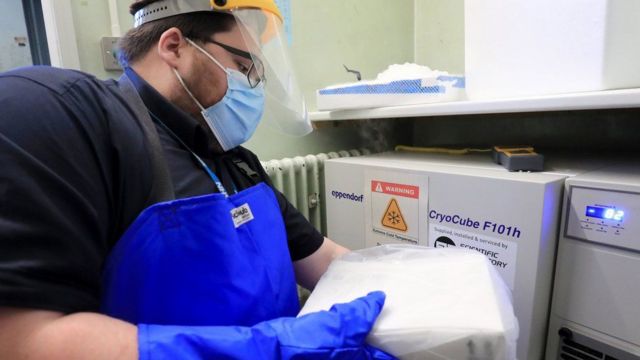
Image source, Getty Images
—
The vaccine must be stored at a temperature of 70 degrees below zero.
–
In England, 50 hospitals have been selected to start vaccination, which starts simultaneously in Scotland, Wales and Northern Ireland.
–
So far, they have been ordered 40 million dosesenough to vaccinate 20 million people.
–
Currently, there are about 800,000 doses available in the country. Another four million doses are expected to arrive before the end of the year, and the rest in 2021.
–
The government indicated that it does not rule out resorting to the army to guarantee their arrival.
–
Its distribution will be more like “a marathon than a short run,” warned Stephen Powis, medical director of England’s National Health Service (NHS), who estimates that it will take several months to inoculate all the people who need it.
–
Temperature of 70º below zero
One of the biggest problems that makes logistics a complex operation is that the vaccine must be stored at a temperature of 70 degrees below zero.
–
Each box that travels from the Belgium plant to the UK is closely followed by a tracking system to monitor that the temperature is maintained.
–
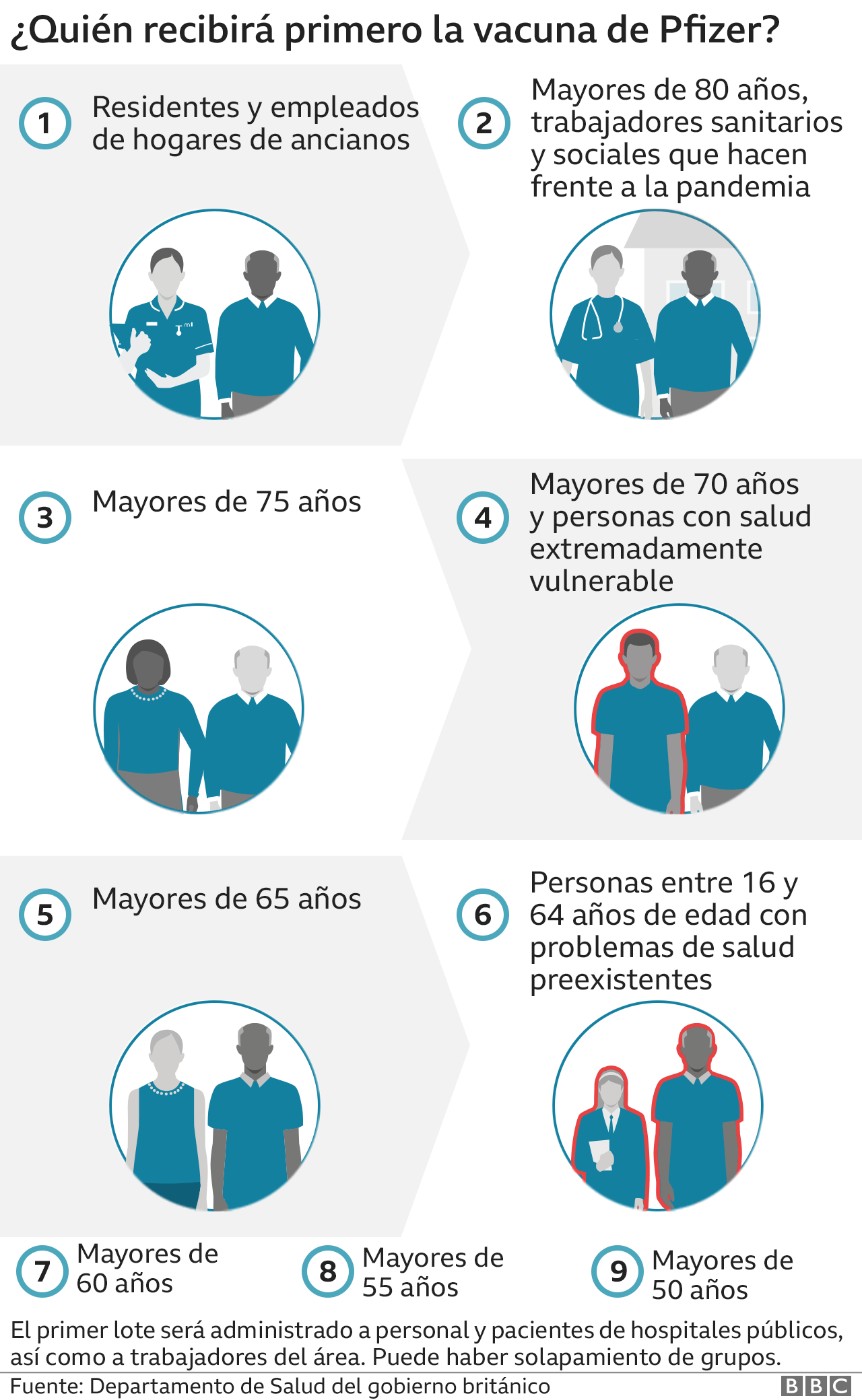 —
—
–
Even so, once they arrive, a specialized team checks that the boxes – which contain 975 doses each – have not been damaged during the trip. This can take up to a day.
–
Dividing the box into smaller packages is not as easy as it sounds.
–
The UK regulatory body has approved a method for doing this, but noted that it must be done with extreme care to avoid wasting doses.
–
The hospitals selected to date to start vaccination have facilities to keep vaccines at 70 degrees below zero.
–
Once the boxes are divided and the vaccines thawed, they can be stored in a refrigerator at 2-8 ° C for up to 5 days.
–
Priority groups
The first to receive the vaccine will be the old people who already attend the hospital as outpatients, as well as those who have just been discharged from the hospital.
–
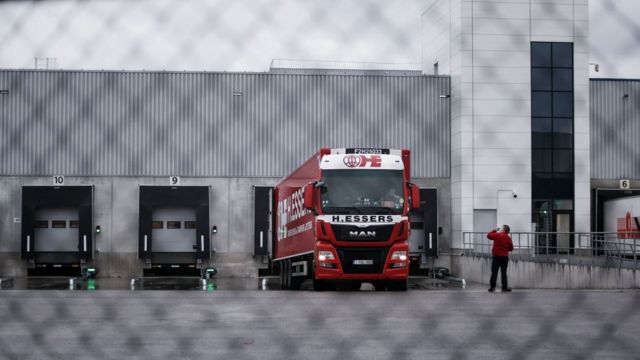
Image source, Getty Images
—
The vaccine is produced in a plant of the pharmaceutical company Pfizer in Puurs, Belgium.
–
Seniors will also be invited 80 years to receive the vaccine in the hospital, and to staff who work in nursing homes.
–
Appointments available that do not use these groups will be used for healthcare workers, who are at the highest risk of becoming seriously ill from the virus.
–
Although the elderly living in residences constitute the priority group (of nine groups established by the government) at the moment, vaccines will not be able to be carried there due to the difficulty of dividing the boxes into smaller packages mentioned above.
–
It should be remembered that although immunity to the virus is activated after the first dose, the full effect of the vaccine is recorded only seven days after the second.
–
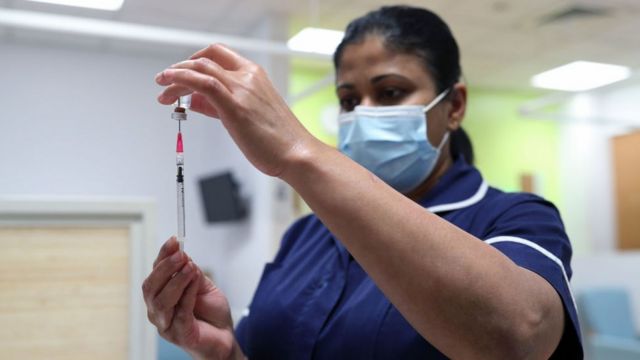
Image source, Getty Images
—
The vaccine requires one dose, and a booster at three weeks.
–
That is why everyone who receives the vaccine will be given a second date at three weeks to complete the process.
–
In addition to the challenge of bringing the vaccine to the population, health experts warned of the importance of educating the population and persuading them to support the vaccination program.
–
There are fears that misinformation about vaccines and the fact that it developed in a much shorter time than usual may make some people reluctant to get it.
–
 —
—
–
Now you can receive notifications from BBC News Mundo. Download our app and activate them so you don’t miss our best content.
—
